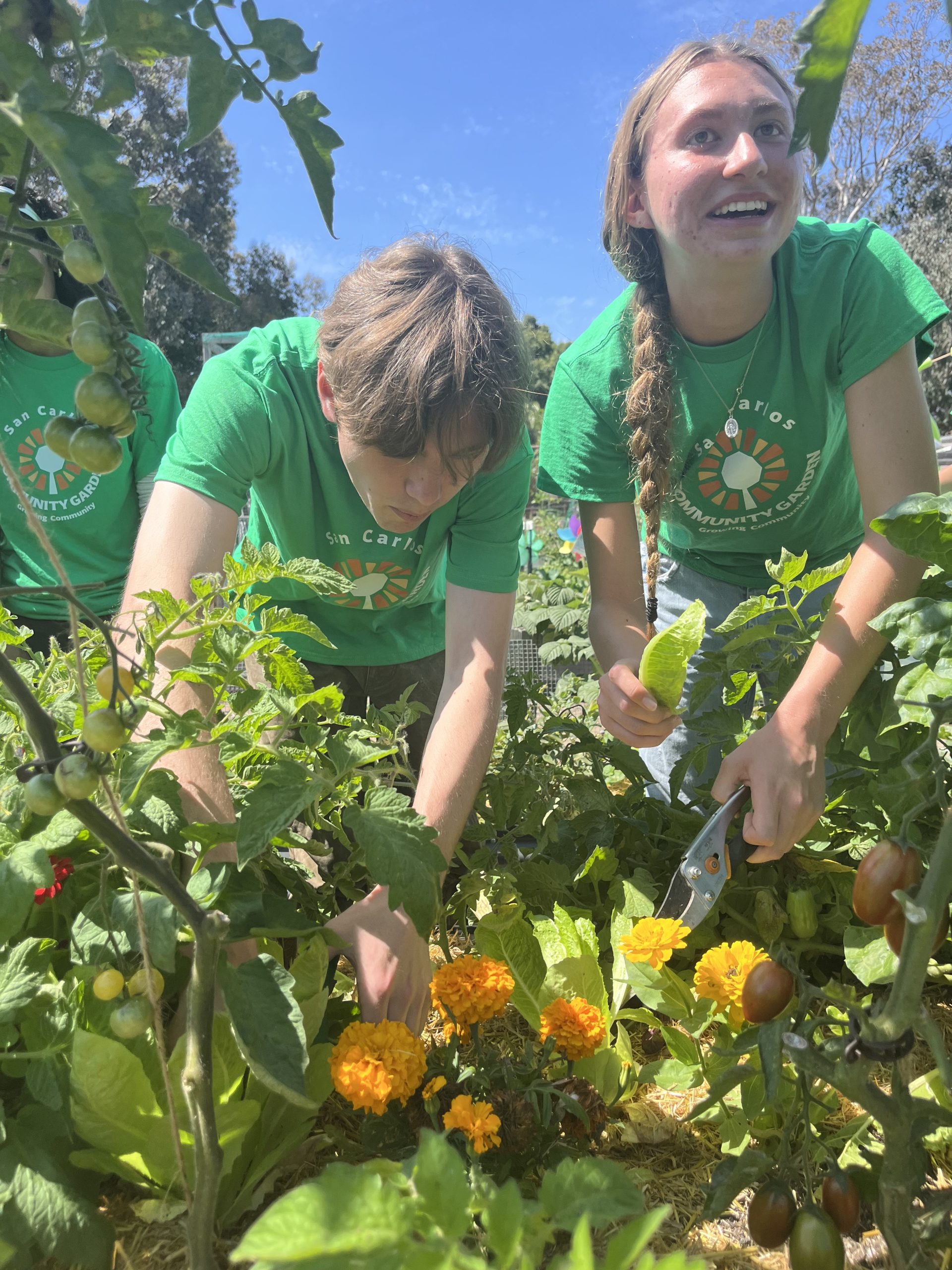
Engaging Students in Sustainable Gardening
The San Carlos Community Garden (SCCG) is playing a vital role in engaging students from Patrick Henry High School through its Youth Ambassador Program. This initiative offers young people the opportunity to learn about gardening while contributing to their community. The program has become a valuable educational experience for students, combining hands-on learning with community service.
Lara Dickens, a physics and AP environmental science teacher at Patrick Henry High School, shared how the program began. Around 10 years ago, a parent and SCCG volunteer invited her AP environmental science class to participate in a fall garden event. At the time, the garden was small, and students helped supervise a bounce house and manage a pumpkin smashing booth. Old pumpkins brought by the community were turned into compost using baseball bats. It was an exciting and memorable event that sparked interest among students.
Dickens noted that while inviting students to help can be risky, it has led to meaningful opportunities. As the garden grew, so did the need for more skilled volunteers. Fortunately, there have always been garden volunteers willing to teach students about gardening. However, participation during the school year can vary due to conflicts such as sports, work, or other events. Some years see more students interested in gardening than others.
Benefits of Hands-On Learning
For those students who are able to participate in the activities at SCCG, the benefits are numerous. Dickens emphasized that students gain experience working with flowers, fruits, compost, soil, vegetables, trees, seeds, and succulents. They also learn about community planning and the logistics of maintaining a sustainable community garden.
Growing food requires a lot of effort and resources, and this program helps students understand the hard work involved. While school gardens may give the impression that gardening is fun and easy, the reality is that it takes time, dedication, and financial support. The Youth Ambassador Program brings everything together, teaching students the skills needed to grow food and appreciate the effort it takes to do so.
Leslie Nelson, a member of the SCCG Education Committee, has been involved with the community garden for about 10 years. She started by leasing raised beds and later expanded her involvement. With 35 years of gardening experience, she has worked with students of all ages since her children were in kindergarten. Prior to the pandemic, she began working with students from Patrick Henry on gardening, eventually forming the Henry Gardening Club.
Nelson continued to work with students during the summer, teaching them about gardening and helping them design and plant raised beds with veggies and flowers. Students also had the chance to interact with other gardeners at SCCG, learning about plants, ecology, and even releasing native bee cocoons. These experiences were highly beneficial and positive for the students.
Expanding the Program Post-Pandemic
During the worst of the COVID-19 pandemic, the program was temporarily halted. After restrictions eased, Patrick Henry tightened regulations on student participation at SCCG. In response, Nelson and Dickens developed a new program called the Ambassador Program. This initiative not only taught students about gardening but also introduced them to the workings of a non-profit organization.
Last year, the student ambassadors attended a leadership board meeting, gaining insight into the leadership and business aspects of running a garden. The program provided a valuable avenue for students to learn about gardening while contributing to the growth of the community.
Positive Ripple Effects
Nelson sees the many programs offered by SCCG as having beneficial ripple effects within the community. People learn how to garden organically and better understand how to make a positive impact on the environment through seminars, events, and raised bed leases. While there is still more to do, the progress made is significant.
Payton DeGroote, an educator for the Youth Ambassadors program, has seen the benefits firsthand. Although she only started this summer, she has already gained valuable hands-on experience. DeGroote is studying Ecosystem Science and Sustainability at Colorado State University and believes that learning sustainable practices in young adulthood is essential.
She has enjoyed watching high school students learn about ecology and how to run a garden. DeGroote emphasized that sustainability is becoming increasingly important due to climate change, and learning these practices early on can have long-term benefits for both individuals and the environment.
Student Perspectives
Ava Chamberlain, a first-year participant in the program, shared her experience. She was drawn to the program through her environmental science class, which sparked her passion for making a lasting impact on the world. Chamberlain described the program as educational and hands-on, with activities such as working with bees, soil, composting, and harvesting.
She also appreciated the welcoming community at the garden. Chamberlain encouraged future students to join the program, noting that no prior experience is required—just a willingness to learn and have fun. She highlighted the value of the work done, as the garden supplies food to the local food bank and Sierra School, making a meaningful contribution to the community.
A Fun and Educational Experience
Chamberlain advised future students to expect a fun and educational environment where they can ask questions, get their hands dirty, meet new people, and participate in events like the produce exchange. She emphasized that the program is open to everyone, regardless of prior experience, and encourages students to take part in the meaningful work being done at the garden.